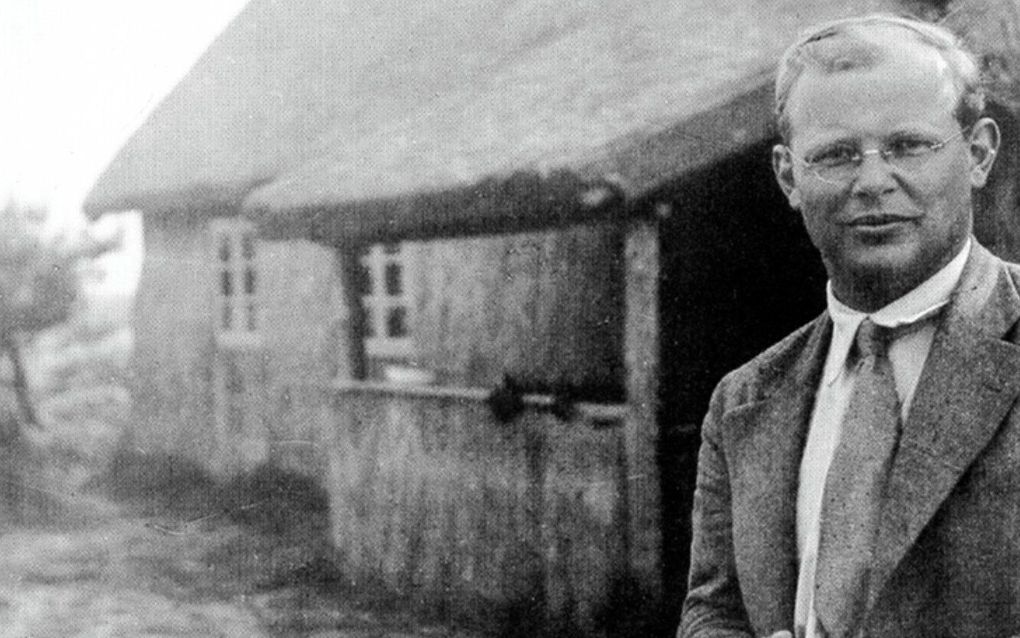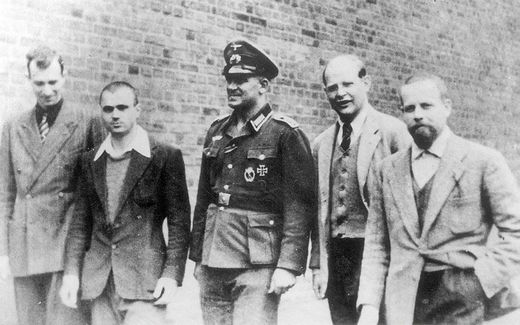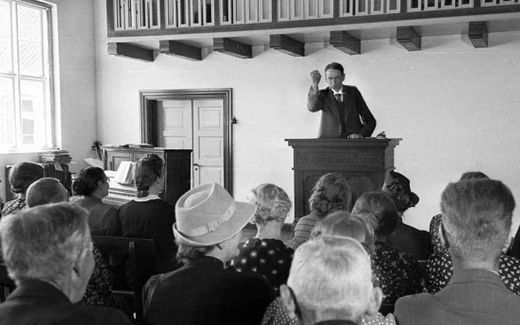Dietrich Bonhoeffer: following, even when you have to pay with your life
01-10-2022
Christian Life
Geerten Moerkerken, RD

Dietrich Bonhoeffer. Photo Gütersloher Verlagshaus
Christian Life
It is not easy to characterise the work of the theologian Dietrich Bonhoeffer (1906-1945). Liberal and orthodox alike find something in the work of the widely quoted German theologian. His life and death as a dissident in the Second World War arouse admiration. So does his unique theology, but it simultaneously raises questions. Who was he?
To answer the question of how to look at the works of Dietrich Bonhoeffer is not easy. What is striking is that the theologian is quoted with approval both in pious and liberal circles. He arouses admiration for his original theology and no less for his conscientiousness as a resistance fighter in World War II.
The broad appreciation also shows the elusiveness of the Lutheran theologian. There are several reasons for that. The main one is that Bonhoeffer was in full development during his lifetime. Not without reason, his friend Eberhard Bethge gave his bulky biography on Bonhoeffer the subtitle "Theologian – Christian – Contemporary". In doing so, he typified three very different phases in Bonhoeffer's life.
"We should never argue with the devil about our sins, but we should speak about our sins only with Jesus. We should tell the devil that Jesus has called to Himself, not the righteous but sinners. And that we –in defiance of the devil– wish to remain sinners in order to be with Jesus, than be righteous with the devil." -(Excerpt from "Temptation")
These periods help to understand him better. First of all, Bonhoeffer was a theologian. At university, he was shaped by a liberal climate, where the historical-critical method of reading the Bible was the starting point. That shaped him throughout his life. In this sense, Bonhoeffer is a thoroughly 'modern' theologian.
Yet he struck out on a different path from his liberal teachers. Three 'encounters' are the reason for that. First, there was the discovery of Martin Luther's theology. In it, he discovered the "sola gratia"; by grace alone. Lutheran lines can be found in many of Bonhoeffer's works, regularly with direct quotations.
A second defining encounter was with the work of his contemporary Karl Barth (1886-1968). Barth's emphasis on God's revelation –vehemently opposed by Bonhoeffer's teachers– aroused admiration in the young German theologian.
Conversion
A third 'encounter' was the most profound for Bonhoeffer: the one with the Word. He writes about it himself: "I plunged into work in a very un-Christian way. An... ambition that many noticed in me (...). Then something happened which has completely changed my life to the present day. For the first time, I discovered the Bible. That's a terrible thing to say. I had often preached, seen a great deal of the church, and talked and preached about it – but I had not yet become a Christian. In a wild and untamed way, I was still my own master." Bethge speaks of conversion from theologian to Christian, the second phase in his life.
During this period, Bonhoeffer would write some of his best-loved works: "Living Together" and "The Cost of Discipleship". Revealing is his reckoning with "cheap grace", where Christians want to find freedom in the Gospel, but not Christ's call to follow Him: a call that costs people their lives.
Who is Dietrich Bonhoeffer?
Dietrich Bonhoeffer is born on 4 February 1906 in the (then) German town of Breslau. The son of a psychiatrist grows up in a liberal, non-churchgoing family, where his choice to study theology stands out.
He studies under liberal teachers such as the famous church historian Adolf von Harnack. He discovers Martin Luther's theology during his studies, which will shape him throughout his life. Already at the age of 21, Bonhoeffer receives his doctorate about the "communion of saints". In his thesis, he lays the foundation for his famous statement that "the church is a church only in being there for others."
Bonhoeffer becomes an assistant pastor in Barcelona and eventually returns to university to teach dogmatics. During this time, Adolf Hitler comes to power. From the outset, the theologian sharply sees the danger of National Socialist ideology and how it is diametrically opposed to Christianity. As early as 1935, Bonhoeffer writes: "Only those who weep with the Jews may sing Gregorian chants."
The German church becomes divided over attitudes to the government. Many theologians invoke Luther for their support of Hitler. Together with Karl Barth and others, Bonhoeffer strongly opposes this. After a schism over this in the German church, the so-called "Bekennende Kirche" (Confessing Church) comes into being. Bonhoeffer goes to work for this church as a lecturer at the theological seminary in Finkenwalde. During this period, he writes some of his best-known works, such as "The Cost of Discipleship" and "Community Life".
The theologian refuses conscription into the army for pacifist reasons and defects to America in 1939. However, he comes to the conviction that he must go back. "I have concluded that I made a mistake in coming to America. I have no right to participate in reconstructing Christian life in Germany if I do not go through the trials of these times with my people."
During the war, Bonhoeffer becomes involved in a resistance group. When its members carry out a failed attack on Hitler in 1943, Bonhoeffer is also arrested. He is imprisoned for a year and a half. His theological thinking does not stagnate. Behind bars, he works on certain ethics, and his letters and notes from this time are collected in "Letters and Papers from Prison".
In April 1945, Hitler decides to execute the "conspirators." On 9 April, Bonhoeffer is hanged at Flossenbürg concentration camp at the age of 39. "This is the end," he says after hearing his verdict, "for me, the beginning of life."
A Lutheran depth, the sharpness of his analysis of man as an enemy of grace, the focus on pietistic dealings with God – it is undoubtedly these tones through which Bonhoeffer's work also found acceptance in Dutch Reformed circles.
At the same time, in his teachings, there is always a certain distance from Reformed theology. Bonhoeffer thinks strongly from the community, which is sanctified in Christ and therefore shares in His grace. This results in generality in his speaking about salvation, pushing personal appropriation of salvation into the background.
"Cheap grace means the justification of sin without the justification of the sinner. Grace alone does everything, they say, and so everything can remain as it was before (…). Costly grace is the Gospel which must be sought and sought again, the gift which must be asked for (…). Such grace is costly because it calls us to follow Jesus Christ. It is costly because it costs a man his life, and it is grace because it gives a man the only true life. It is costly because it condemns sin, and grace because it justifies the sinner. Above all, it is costly because it cost God the life of His Son (…), and what has cost God much cannot be cheap for us. Above all, it is grace, because God did not reckon His Son too dear a price to pay for our life, but delivered Him up for us." (From "The Cost of Discipleship")
Without religion
Much more difficult still is to characterise Bonhoeffer in his last phase of life, that of "contemporary". Especially in prison, his thinking is still developing strongly, as his letters and notes, collected in "Letters and Papers from Prison", show.
The world has become "verbal", writes Bonhoeffer, and Christians will have to take a different place in it. The church should no longer aspire to old positions of power; even speaking about God can no longer be done as before. Bonhoeffer speaks of a "religionless faith" that "speaks worldly of God, without religion. God lets us know that we must live as people who can cope with life without God."
It is not easy to gauge his words. Liberal movements in the last century often used them as an argument for a theology that focuses not so much on God but on social justice in this world. Understandably, they found in Bonhoeffer's words a starting point for their position. Still, it is questionable whether they did full justice to the theologian.
Good forces
Sheltered wonderfully by powers of goodness
Surrounded truly and silently by powers of goodness
protected and comforted wonderfully
thus I would live these days with you (all)
and go with you into a new year
Still, the past is trying to torture our hearts
Still, the heavy load of evil days is squeezing us
Oh Lord, for our jolted souls
prepare the health that you have made us for
And may you offer the heavy bitter cup
of grief, filled to the very rim
We'll take it, thankfully, without trembling
from your good and beloved hand
From "Letter and Papers from Prison"
Three divergent phases in the life of a theologian of great thinking power make it difficult to put his theology under a single heading. Moreover, Bonhoeffer's thinking was never complete. His theology was still developing, especially during the prison years 1943-1945. But it never concluded, amounted up to an overall vision. Bonhoeffer was only 39 years old when the Nazis executed him and thus also brought his theologising to an end.
"The Big Three"
The "Big Three", they are sometimes called. Dietrich Bonhoeffer, C.S. Lewis and Tim Keller are well-known and popular theological writers in the Christian world.
However, in pietistic Reformed circles, their works are not undisputed. The Dutch columnist and elder Laurens van der Tang writes a critical article on the "Big Three" in the church bulletin of the Reformed Church in the Netherlands and America (RCNA). He concludes that "distancing is appropriate" and that these "authors cannot replace theologians from the Reformation or the Dutch Second Reformation."
Also, the Dutch Rev. A. Schreuder writes that "whoever reads the works of the Big Three misses the ultimate point of the personal appropriation of salvation."
Who were the "Big Three"? This series sheds light on their work and the question of how we should look at them.
This is the first part of a triptych about three remarkable post-war theologians Dietrich Bonhoeffer, C.S. Lewis and Tim Keller
Related Articles





